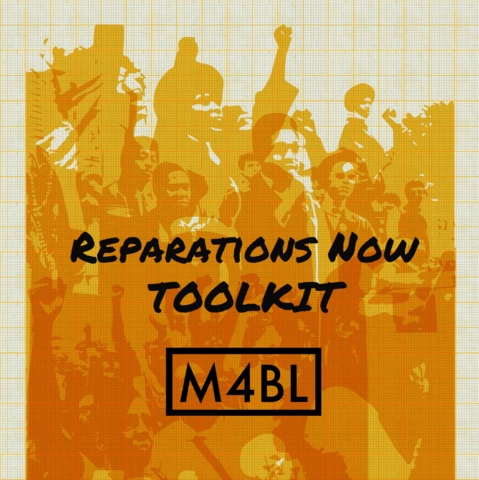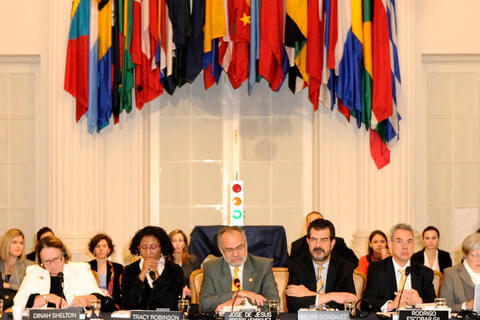
Reparations
Reparations Now! Toolkit
This toolkit explores the long history of struggles for reparations for Black people, lays out key facts, concepts, and international human rights law underlying reparations demands, and provides case studies of struggles for reparations at the institutional, local, state, and international levels. Our goal in creating this toolkit is to provide a foundational definition of what reparations are, to advance our argument that reparations for Black people in the United States are essential, to inform public discussion about reparations, and to support organizers seeking reparations at the local, national, and international level in order to advance our collective struggles for Black liberation.
Reparations Now! Toolkit
Learn About our Reparations Work
The Thurgood Marshall Civil Rights Center’s mission is to serve as the University’s flagship institutional setting for the study and practice of civil rights, human rights, and racial justice law and advocacy. The reparations movement embodies our shared values of dignity, human rights, and equal justice under law. We are glad to serve in this struggle for reparations for the historic and ongoing human rights violations against Afro-descendants in the United States.
Inter-American Commission Hearings
The Center hosted a groundbreaking hearing on reparations at the Inter-American Commission on Human Rights, which engaged many of the most prominent reparations scholars and activists, including Congresswoman Sheila Jackson Lee, the sponsor of HR 40, one of the co-founders of N’COBRA, the ACLU, and others.
U.S. African American Redress Network
The U.S. African American Redress Network was created when the Thurgood Marshall Civil Rights Center at Howard University School of Law and the Institute for the Study of Human Rights at Columbia University teamed up to spotlight the numerous local reparations initiatives across the nation and be a resource in support of such efforts. Howard University law professor Justin Hansford serves as the executive director of the Thurgood Marshall Civil Rights Center and he spearheaded the Redress Network along with Dr. Linda Mann, who spearheaded the project on behalf of the Institute for the Study of Human Rights. Students will have the opportunity to work on this project as members of the clinic, student interns, or volunteers.
Our Work in Evanston, Illinois
The Center along with the African American Redress Network developed an impact study of Evanston, IL in order to investigate the historical impediments of racially discriminatory practices and the effects of Evanston’s Restorative Housing Program. The study found that there is a causal relationship between exclusionary zoning policies and the current racial economic and housing disparities in Evanston. The report supports the provision of a reparations program in Evanston.
Our Work in Brown Grove, Virginia
Brown Grove is a historically Black community in Hanover County, Virginia. Originally settled by free slaves in 1870, they founded the Brown Grove Baptist Church, which continues to be a central part of the neighborhood 150 years later. Now a tight knit community of hundreds of people who have thrived through adversity because of their deep solidarity.
This community has endured decades of industrial encroachment and neglect from government officials. Industrial gentrification is occurring in this town. Wegmans grocery is planning the construction of a distribution center that would displace multiple burial sites, as well as wetlands that are essential to the area. In response, many residents alongside the Brown Grove Preservation Group have proceeded to take action. Through protests and sit-ins, taking place outside of Wegmans grocery stores, activists have been gaining recognition.
Wegmans began construction of the distribution center in 2021 despite multiple lawsuits that delayed their schedule. Amid the fight, there have been a few breakthroughs in favor of Brown Grove. The community is in the process of becoming included on the Virginia Landmarks Register and the National Register of Historic Places, which would allow for them to gain protections. While there has not been confirmation regarding the state of their neighborhood, the Brown Grove activists and allies continue their efforts to resist.
Our Work at the Reparations 2022 Conference
The 3rd Annual Reparations 2022 Conference was held on April 1st and 2nd in collaboration among FirstRepair, African American Redress Network (AARN), the International Center for Transitional Justice (ICTJ), the Institute for the Study of Human Rights at Columbia University, and the Thurgood Marshall Civil Rights Center at Howard University School of Law. The goal of the conference had been to connect, support, and amplify African descendant communities in the battle for holistic reparations, which include the areas of restitution, rehabilitation, compensation, satisfaction, and guarantees of non-repetition.
The rubric for reparations efforts that had been used are racial harm, historical context, and efforts toward repair. Descendant communities are the focal point for these reparations efforts because they know how to articulate their experiences and create their own narratives for holistic repair, which is why an element of the Conference is an anthology style document that will be the collective creation of those who attended. The notes, thoughts, musings, conversations, and presentations that were developed over the course of the Conference shall serve as vital resources in the production of this reparative anthology.
The 3rd Annual Reparations Conference sought to build off the foundations that had been laid the previous two years, with a focus this year on: advancing reparations at the municipal and state level, developing regional cohorts, decolonizing the academy, building community coalitions, articulating the legal frameworks for repair, and providing avenues and resources as the journey for reparations continues. The focus of the reparations centered research and resources had been a focus on descendant communities, with the materials that had been developed engaging innovative perspectives that sought a multi-faceted approach to reparative work.
Podcast: Educational Justice Through Reparations
The Thurgood Marshall Civil Rights Center and the Integrated Schools Podcasts discuss the historical and ongoing segregation at the core to educational and racial injustice, that constitutes a breach that, our Executive Director, Professor Justin Hansford, argues is in need of repair – a human rights violation that require reparations.
Justin Hansford writes for ACLU: International Human Rights Bodies Provide a Case for Reparations
In 2019, the center successfully requested a hearing before the Inter-American Commission on Human Rights on reparations enslavement. In this article, Executive Director Hansford continued to articulate the legal theory for reparations using international law.
ACLU: International Human Rights Bodies Provide a Case for Reparations
The Cost of Inheritance
In 2024, Hansford appeared in the documentary “The Cost of Inheritance,” which aired nationally on PBS during the Martin Luther King Jr. holiday weekend.
Justin Hansford's Opening Remarks to the Second Session of PFPAD
In 2023, Hansford delivered a speech on reparations before the United Nations, arguing that “reparations is what justice looks like in the 21st century.”
